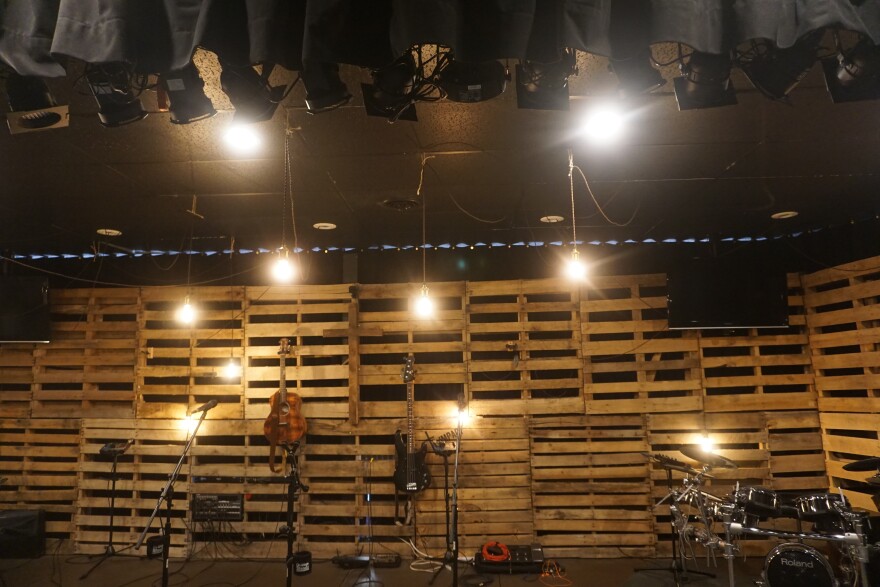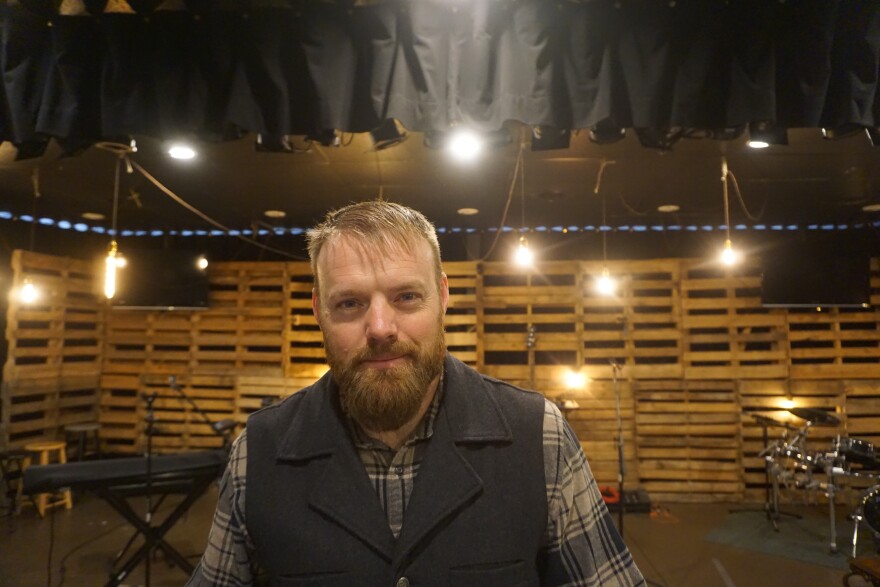Impact Ministries is tucked away on Maple Street in Wheatland.
On a pastel-blue Sunday morning in May, congregants stood outside the church and greeted each other, laughing and swapping stories. The rest of the town was very still. Not many cars drove by.
Inside, the church vibrated with activity. A line of people waited in front of a coffee shop. Hunting trophies reared their heads from the wall of an office, and in a bustling sanctuary, Speaker Pro Tempore Rep. Jeremy Haroldson (R-Wheatland), a member of the state’s hard-line conservative Freedom Caucus and pastor, preached to his congregation from a stainless steel pulpit he built.
He stood in front of a wall of decorative wooden pallets and yellow string lights, wearing a flannel shirt and vest.

“ There’s two avenues of church in America right now,” said Haroldson. “There's an avenue of church in America, in my opinion, that has taken the word of God and perverted it, right? We don't call sin, sin anymore. Well, guess what? Sin is sin. What does sin cause? Sin causes death. Do you need the gospel? Absolutely. But we're going to take – we're just going to water this down. Why? Because we'd rather it be seeker-friendly than hard-line.”
After the Wyoming Freedom Caucus took charge of the state House in the last legislative session, journalists and lawmakers noted an uptick in public references to Christianity by the new electeds.
On the first day of the 68th Wyoming Legislature, one endorsee of the caucus sang a hymn, accompanied by Haroldson’s daughter on violin. Some committee meetings started with representatives praying over their colleagues and the public.
“I would say that the shared faith in Jesus doesn't just drive the legislative priorities that the members have,” said the Wyoming state director of the caucus, Jessie Rubino, during the session. “It drives everything that they do.”
While legislation having to do with religion isn’t new, lawmakers endorsed by the caucus drafted and backed several bills aimed at protecting and expanding religious expression during this year’s legislative general session, including:
- HB 114 - Protecting religious assembly in states of emergency act
- HB 207 - Religious Freedom Restoration Act
- HB 335 - Wyoming educational religious freedom act
In addition to those, caucus members have also cited a series of bills aimed at restricting abortion access in Wyoming as being based in scripture, as well as a bill, now law, that establishes legal definitions for the terms “men” and “women” in the state.
“ There have been legislatures over the years that kind of go in these two and three year spurts, where this kind of thing has happened a lot,” said former WPR News Director Bob Beck. He covered the Legislature for decades starting in 1988 until 2023. “It typically is the newer legislators. They'll come in, they'll have some religious ideals that have been behind some legislation. It's not that unusual and has happened in the past, but maybe not a majority.”
Having an impact
Impact Ministries is part of a Pentecostal Christian denomination known as Assembly of God. It centers around four core beliefs: salvation, baptism in the Holy Spirit, divine healing and the second coming of Christ. The faith has been growing steadily in the U.S. since the 1970s.
Sitting behind the desk in his office after the service, Haroldson set the scene for how his church came to be planted in Wheatland.
He and his peers started out at a different Assembly of God church in town.
“There was a pastor that came into that church that was from South Africa and just had very much a different viewpoint on things,” he said. “I mean, he didn't understand the culture of Wyoming. He didn't understand cowboy culture.”
Haroldson and others in the church split off to form their own, with more of an emphasis on going out into the community to evangelize. It began on a small scale, he said.
“[It] started with 15 people in the basement of a house, and it ended up moving to probably 25 to 30, at that point, in the living room of another person’s house,” Haroldson said.
Assembly of God then came to Haroldson and other church leaders and asked if they’d like to be part of the denomination. They said yes.
Haroldson said Impact receives no monetary support for being under its umbrella.
These days, Impact’s congregation has grown, and it’s settled into the Maple Street location. But the church’s reach into the community extends beyond its wood-shingle roof.
“I've got a 150-foot American Ninja Warrior course that I set up for kids,” Haroldson said. “We do a lot of crazy things that are outreach-based.”
Daniel Gil, a featured contestant on the reality television show American Ninja Warrior, came out to the course after Haroldson reached out, he said.
Haroldson leads a youth shooting sports program, too.
“ I take first-time hunters into the field, and I also have a shooting sports program where we put kids behind weapons – shotgun, black powder, archery equipment – and give them the knowledge and skillset that they need to be able to step into the field and hunt,” he said.
His wife, Lori, is a worship leader at Impact. Four of his seven siblings go to church there.
From the pulpit to the people’s house
During the recent legislative session in February, Freedom Caucus leaders in the House, including Haroldson, held a press conference at the state Capitol.
He talked about the idea of separation between church and state. In his view, the firewall was only ever meant to go in one direction.
“It is not the government's role or job to dictate to the church its function or role, but it is the role of the church to dictate to the government its function and role,” Haroldson said while sitting around a conference table with Rep. John Bear (R-Gillette), the state Freedom Caucus’s former chair, and House Speaker Rep. Chip Neiman (R-Hulett), the latter of whom also attends an Assembly of God church and is a Freedom Caucus member.
Haroldson believes the political left has distorted the origin of church-state separation to keep churches from weighing in on politics.
“It's not in the Constitution,” he said. “It's not a constitutional principle. It's not even actually a founding document principle. [The framers] had an idea that there should be a separation of state and church, but not church and state.”
Elizabeth Cavell is a constitutional lawyer and deputy legal director with the Freedom From Religion Foundation, a nonprofit that promotes nontheism. Cavell said that while it’s true that the exact phrase “separation of church and state” doesn’t appear in the U.S. Constitution, she differs with Haroldson on his interpretation of what that means.
“Both our founders and our courts have understood the First Amendment to embody a principle of secularism, which means separation between religion and government both ways,” she said.
That “both ways” dynamic goes back to the origin of the country, she said.
“Those principles were written about a lot by the framers of the Constitution, not just Thomas Jefferson, but James Madison,” Cavell said. “They were embodied in the religious freedom statutes in Colonial Virginia, which Jefferson was extremely proud of, and which was the inspiration for our First Amendment.”
For Cavell, the idea that the separation between church and state is a one-way track can be traced back to revisionist historians and evangelists like David Barton.
“ This has been the framing of Christian nationalists and theocratic leaders in this country for as long as we've had the separation of church and state,” Cavell said.
In a series of phone interviews after the session ended, Haroldson said he views his religious and political jobs as being two sides of the same coin.
“ I don't compartmentalize my life,” he said. “If I'm in the Legislature, I'm a pastor of the Legislature, and if I'm in the pulpit, I'm also a politician in the pulpit. When I'm going through [a] session, the church is going to know. When I'm in the off season, I pull parallels from what’s going on politically in my life and what's going on spiritually in my life, because they do go hand in hand a lot of times.”
The idea of being political at the pulpit has, of late, garnered national attention.
That’s because in a recent court filing, the Trump administration’s Internal Revenue Service (IRS) broke with precedent in saying houses of worship can endorse political candidates from the pulpit without losing tax-exempt status.
A 2019 survey by Pew Research found that 76% of Americans and 70% of Christians say clergy should not endorse candidates from the pulpit, though evangelicals and Black Protestants were less likely to disapprove.
Haroldson said the move by the IRS is vindicating for him and other faith leaders.
“Really, at the end of the day, [the IRS] are responsible for First Amendment violations, in my opinion, First Amendment violations for an extended period of time,” he said.
He doesn’t tell his congregants how to vote, he said, but he does tell them how he’s going to vote.
“It's never stopped me personally from being very bold from the pulpit about political things, because [as] I've said from the very beginning, if they want, they can make me their first example,” he said. “I’ve had people in the congregation say, ‘Hey, question, how would you vote for this, that, or the other?’ And I've made that known how I would vote.”
Expanding impact
As Wyoming’s political machinery continues to hum along, Impact Ministries has begun a process of transformation.
Haroldson said his political life has limited the time he has available to be a pastor, especially during sessions, when he’s expected to be in Cheyenne.
So the church has decided to add four more pastors to the lineup, including him, as part of a team-oriented “five-fold ministry.”
Impact is also moving to a 17-acre plot of land in town at 251 Preuit Road. It’s rebranding itself as an as-yet unnamed community center that the church will meet in, a combination Haroldson said doesn't exist in Wheatland at the moment. The center is intended to be of use for the public beyond Sunday mornings.
“ I think that there’s excitement for direction and vision,” Haroldson said. “I think there's fear, obviously, because of change.”
Plus, in addition to his pastoring and political side, he's moving into a new line of work.
“ I’m starting Old Glory Arms,” he said. “I'll be manufacturing and selling long-range precision weapons as well as AR platform guns.”
He sponsored the repeal on most gun-free zones, HB 172, that went into effect this month.
The moral fabric of Wyoming and the U.S. is based on scripture, according to Haroldson. And if residents of the state don’t see eye to eye with him on that?
“ If you don't like how someone's governing you, replace them,” he said. “But I can tell you right now, about 80% of this community believes how I believe.”
Haroldson said the hope is for the first shell of one of the community center buildings to be erected by the spring of 2026.
This story is the first in a series by state government reporter Chris Clements on the interplay between religion and politics in Wyoming. Think you have a story that would work well in the series? Send Clements a tip at cclemen7@uwyo.edu.
This reporting was made possible by a grant from the Corporation For Public Broadcasting, supporting state government coverage in the state. Wyoming Public Media and Jackson Hole Community Radio are partnering to cover state issues both on air and online.









